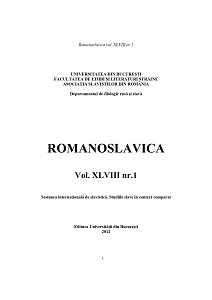Foşti demnitari polonezi refugiaţi în România în timpul celui de-al doilea război mondial
Former Polish dignitaries refugees in Romania during World War II
Author(s): Ion ConstantinSubject(s): Diplomatic history, Military history, Political history, WW II and following years (1940 - 1949)
Published by: Editura Universităţii din Bucureşti
Keywords: Ignacy Mościcki; Felicjan Składkowski; Józef Beck; Aro Braşov; Stăneşti; Romanian’s hospitality;
Summary/Abstract: In the night of the 17/18 September 1939, president of Poland, Ignacy Mościcki, premier Felicjan Składkowski, ministry of Foreign Affairs, Józef Beck and other members of Polish Government crossed on the Romanian territory. They were received with the ospitality in Czernowiec (Cernăuţi). In 1939, Romania and Poland made a gesture of solidarity in a dark time in history. Even if after the war they both fell under Soviet occupation, such gestures were not forgotten. As many as 100,000 Polish took refuge in Romania, in an attempt to save their lives and find a place to regroup and start fighting for their country again. Then, majority of the high former polish politicians refuge in Romania crossed to their Western allies, France and Britain. Only ministry of Foreign Affairs, Colonel Józef Beck spent the last five years of his life in the internment in Romania. The Romanian hosts were under strong pressure of the Germans striving to prevent them from releasing Beck from Romania. At first, Beck and his family and several persons stay in the luxury hotel „Aro” in Braşov, later in Bucharest. Colonel Beck made several attempts to free himself from this trap, whereas the undertaking which reached the most advanced stage was his escape on 20 October, 1940. It ended, however, with the arrest Józef Beck and the persons accompanying him. From 1940 when Józef Beck`dangerous disease was discovered, his living conditions slightly improved. The external attempts to render assistance to Colonel Beck – undertaken in the form of diplomatic pressures on the Romanian Government – came mainly from the American Government and partially from the British one. Yet, they were insufficient being deficient in determination and consistency. Colonel Józef Beck’s death occurred in dramatical circumstances as regards his living conditions – evacuated from Bucharest for fear of the Allied air raids, he was placed in a building of a village school at Stăneşti where he died on 5 June, 1944. Buried in the military cemetery Bellu in Bucharest – in compliance with his earlier expressed wish – in a position „facing” Poland, he rested there till 1991 when due to the changed political conditions in Poland his mortal remains were brought to Warsaw.
Journal: Romanoslavica
- Issue Year: XLVIII/2012
- Issue No: 1
- Page Range: 222-237
- Page Count: 16
- Language: Romanian

